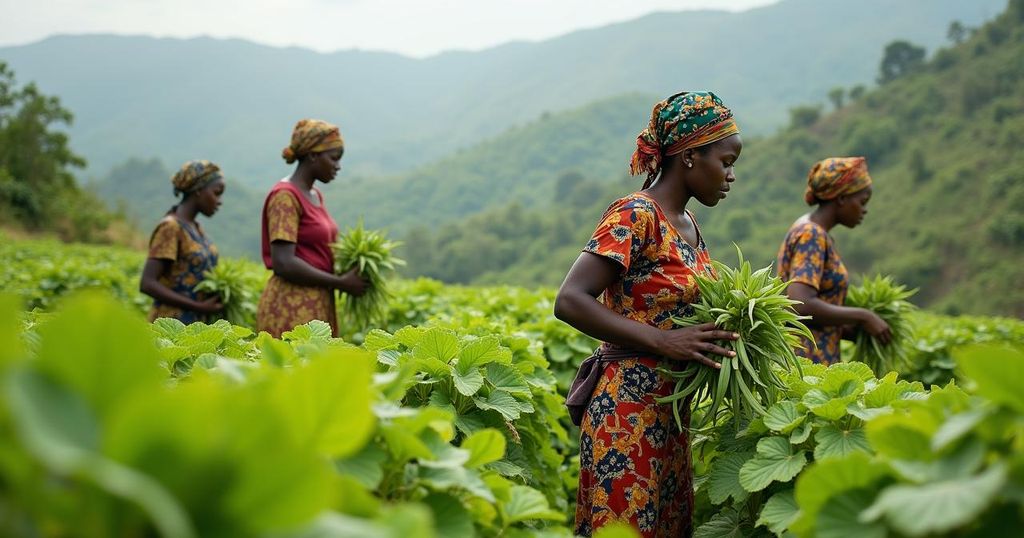Women Farmers in Ghana: Pioneering Climate Action and Sustainable Agriculture
Women farmers in Ghana, representing 70 percent of the agricultural workforce, are crucial in combating climate change through sustainable practices. They advocate for systemic reforms and government commitment to climate action, emphasizing the need for gender inclusion in leadership roles related to climate adaptation.
In Ghana, women represent approximately 70 percent of the agricultural workforce, primarily as smallholder farmers who adhere to ecological and organic farming practices. These methods are characterized by a minimal reliance on external inputs and synthetic chemicals, thereby supporting environmental preservation. Through the adoption of agroecological approaches, these women, despite facing restrictions in resources, play a pivotal role in biodiversity conservation, forest protection, carbon capture, and the reduction of greenhouse gas emissions. In light of their reliance on natural resources for sustenance, Ghana’s women farmers are increasingly devoted to defending these vital assets from the threats posed by environmental degradation. United under a broader social movement, Ghanaian women farmers are ardently advocating for systemic transformations in the agricultural sector that target reduced carbon emissions. They are demanding increased government commitment to climate action, emphasizing the need for agroecology to become a foundational component of the nation’s climate strategy. Awula Serwah, an environmentalist and coordinator for Eco-Conscious Citizens Ghana, has highlighted the unique adversities that climate change and environmental degradation impose on women and girls. “Climate change and environmental degradation affect everyone. They are not respecter of persons. In communities where women and girls are responsible for food production, fetching water, and fetching fuel for cooking, it is especially challenging for them,” Ms. Serwah remarked, advocating for urgent action to ameliorate this troubling situation. On the intersection of gender equality and climate change, Ms. Serwah contended that leadership in climate adaptation should transcend gender limitations. “Anyone with a passion, an understanding of climate adaptation and the necessary skills and willingness to lead, should lead. It is crucial that we work towards gender equality, but we should not make climate change a gender issue,” she asserted, drawing inspiration from Kenyan environmentalist Prof. Wangari Maathai, a pioneer in environmental advocacy who became the first African woman to receive the Nobel Peace Prize for her dedication to ecological issues. “A determined woman with a lot on her plate can lead on climate adaptation just as well as a man,” she stated, referring to Prof. Maathai’s impactful legacy. “The key point is not that she was a woman, but that she was deeply passionate about the environment and was driven to make a difference.” According to Ms. Serwah, it is essential for governments and policymakers to devise effective strategies that include and support women in climate change initiatives. She believes that motivated women leaders in the fight against climate change should be granted the support they require without facing unnecessary barriers. “We all have a constitutional duty to protect the environment, and we should demand action,” she concluded.
The role of women in agriculture is vital, particularly in developing countries such as Ghana, where they form a significant portion of the agricultural workforce. As custodians of agroecological practices, women farmers are uniquely positioned to combat climate change through sustainable farming methods that enhance environmental health and contribute to climate resilience. This movement reflects a growing recognition of the need for inclusive climate action that acknowledges the substantial contributions of women to agricultural sustainability and resource management.
In summary, women farmers in Ghana are at the forefront of the battle against climate change, leveraging their expertise in sustainable agricultural practices while advocating for critical policy reforms. Their collective voice for increased recognition and support highlights the importance of integrating gender equity within climate change strategies. As articulated by Ms. Awula Serwah, empowering women leaders is crucial for achieving effective and inclusive responses to environmental challenges.
Original Source: www.un.org




Post Comment